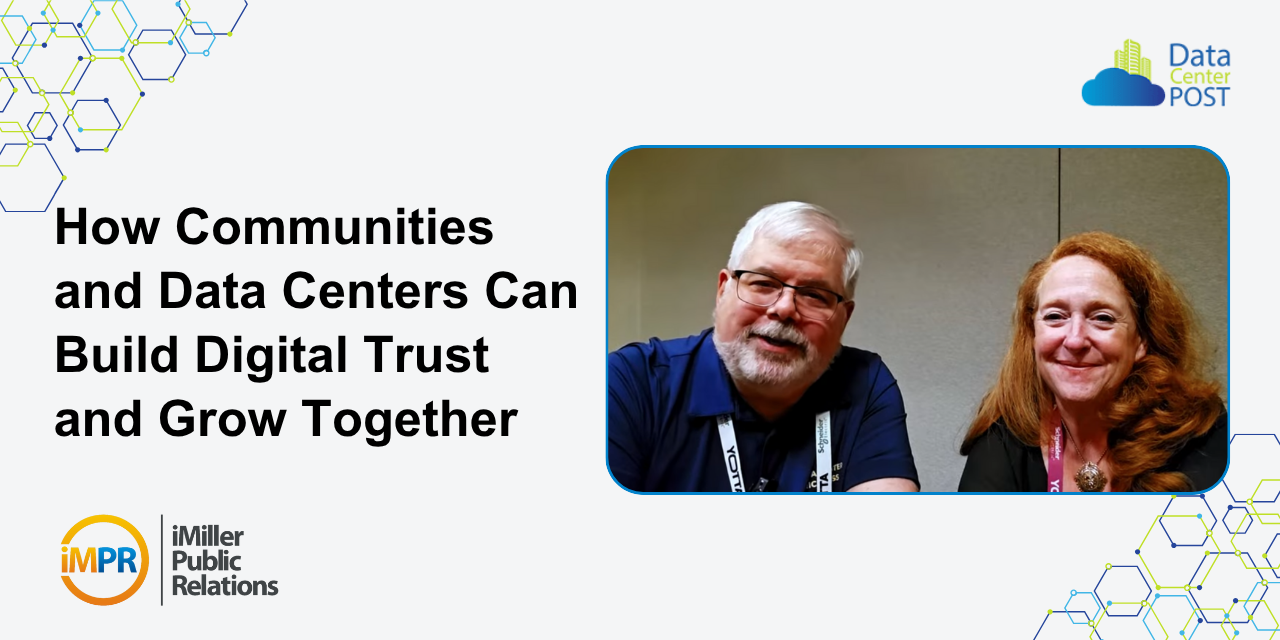When data center developers announce plans for a new facility, one question often echoes through town halls and planning meetings: “What’s in it for us?”
In a recent episode of Data Center Richness with Rich Miller, Ilissa Miller, CEO of iMiller Public Relations and a member of the OIX Digital Infrastructure Framework Committee, shared insights on how improved communication, transparency, and education can reshape the relationship between digital infrastructure and the communities that host it.
A Career Rooted in Connection
Miller’s journey into the world of digital infrastructure began nearly 30 years ago, shortly after the passage of the 1996 Telecommunications Act which opened new competition in the telecom market and gave rise to early colocation facilities. Over the years, her work evolved from marketing and communications leadership roles in telecommunications to founding iMiller Public Relations (iMPR) in 2011.
At iMPR, Miller and her team focus on the foundational elements of public relations, including messaging, content, thought leadership, and brand visibility, to help organizations tell credible stories that resonate with customers, media, and partners. “With AI shaping the way information is discovered, third-party validation is more critical than ever,” Miller noted in the interview. “PR creates the trust that marketing alone cannot.”
The Source of Community Distrust
Data centers, once built quietly and discreetly, are now facing unprecedented public scrutiny. Concerns over energy and water consumption, coupled with misunderstandings about their societal value, have led to increased community resistance.
According to Miller, this tension has roots in the industry’s historic secrecy. “Following 9/11, the industry became protective of facility locations for security reasons,” she explained. “While that made sense at the time, it has contributed to a long-standing sense of mistrust.”
Compounding the issue is a lack of understanding among residents and local officials about how dependent modern life has become on digital infrastructure. “When people are live-streaming a planning meeting to oppose a data center, they’re using the very infrastructure they’re protesting,” Miller observed.
Translating Technology for City Planners
For many local officials, data centers remain a technical mystery. “Community planners think in terms of roads, bridges, and water lines, not fiber, power redundancy, or compute density,” said Miller. “We don’t always speak the same language.”
This communication gap inspired the creation of the Digital Infrastructure Framework (DIF), an initiative under the Open Compute Project’s OIX Association. The framework serves as a toolkit for local governments, helping them assess their current digital resources, identify needs, and plan strategically for future infrastructure.
“This isn’t about convincing every community to host a data center,” Miller said. “It’s about ensuring they understand what they have, what they need, and how digital infrastructure supports everything from healthcare and education to small business operations.”
Educating Through Collaboration
The OIX Digital Infrastructure Framework Committee is actively engaging with trusted organizations and reaching out actively to others, including the National Association of Counties (NACo) and the U.S. Conference of Mayors to reach municipal leaders nationwide.
“These agencies are already fielding questions about technology readiness,” Miller noted. “By partnering with them, we can equip local officials with the knowledge and resources they need to make informed decisions.”
A Path Toward Partnership
Despite challenges, Miller remains optimistic about the future. Communities that once resisted digital infrastructure are beginning to reconsider as they see neighboring regions benefit from enhanced connectivity and business attraction.
“The key is education,” she emphasized. “When people understand how digital infrastructure contributes to local economies and quality of life, conversations shift from opposition to collaboration.”
The Digital Infrastructure Framework Committee welcomes participation from planners, policymakers, and industry professionals. Those interested can visit oix.org or contact difc@oix.org to learn more about upcoming initiatives and volunteer opportunities.


